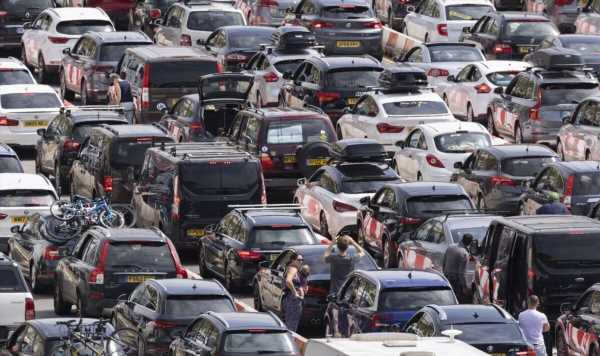Holidaymakers face queue misery as EU states bicker about border app
Blaming Brexit for Dover chaos is ‘lame excuse’, Tory MP says
Infighting between Brussels member states over the implementation of a new system to check non-EU citizens entering the bloc could see British holidaymakers face long queues for over a year. Visa stamps on passports at EU borders are currently needed for UK citizens travelling across the bloc over post-Brexit rules.
Visa stamps on passports at EU borders are currently needed for UK citizens travelling across the bloc over post-Brexit rules.
The EES system, proposed by the EU, would alleviate the border friction caused by Brexit, but France, the Netherlands and Estonia are opposing its implementation.
The system will mean non-EU citizens will have their photo and fingerprints taken the first time they try to enter an EU state.
Long term the system aims to speed up the process of entering and exiting.
The European Union explained: “The Entry/Exit System (EES) will be an automated IT system for registering travellers from third-countries, both short-stay visa holders and visa exempt travellers, each time they cross an EU external border.
“The system will register the person’s name, type of the travel document, biometric data (fingerprints and captured facial images) and the date and place of entry and exit, in full respect of fundamental rights and data protection.


“It will also record refusals of entry. EES will replace the current system of manual stamping of passports, which is time consuming, does not provide reliable data on border crossings and does not allow a systematic detection of over-stayers (travellers who have exceeded the maximum duration of their authorised stay).
“EES will contribute to prevent irregular migration and help protect the security of European citizens.
“The new system will also help bona fide third-country nationals to travel more easily while also identifying more efficiently over-stayers as well as cases of document and identity fraud.
“In addition to this, the system will enable a wider use of automated border control checks and self-service systems, which are quicker and more comfortable for the traveller.”
When it is actualised, the EES will apply to all EU member states – aside from Cyprus and Ireland – as well as four non-EU countries – Iceland, Lichtenstein, Norway and Switzerland.
The original implementation date had already been pushed to May 2023, but as French President Emmanuel Macron worries about potential chaos caused by the new system at Paris’ airports for the 2024 Olympics, the date looks likely to be pushed well after that.
Macron is pushing for the system to be introduced after August 2024.
Thousands of passengers were stranded at the Port of Dover for up to 24 hours over the weekend. Many holidaymakers travelling by coach during the weekend – the start of the Easter holiday period for many schools – were delayed entering the port and being processed.
The queues had cleared by Monday morning but there are fears the congestion could return during other peak periods due to French border officials carrying out extra checks and stamping UK passports following Brexit.
Downing Street acknowledged that “new processes” introduced following the UK’s withdrawal from the European Union contributed to the disruption, while Labour leader Sir Keir Starmer said “of course Brexit has had an impact”.
Disruption was first reported on Friday when the port declared a critical incident and said the delays were “due to lengthy French border processes and sheer volume”.
Home Secretary Suella Braverman told the Sophy Ridge On Sunday programme on Sky News it would not be fair to view the delays as “an adverse effect of Brexit”.
Don’t miss…
UK kicks off talks with EU for another deal to access £84bn funds [INSIGHT]
Fury as Sweden to deport British widow with Alzheimer’s [ANALYSIS]
Leaving the EU is like coming out of an abusive relationship [COMMENT]
On Monday, Prime Minister Rishi Sunak’s official spokesman told reporters: “I think there were a combination of factors that took place over the weekend.”
Asked whether Brexit was one of the factors, the spokesman said the French were “inspecting and stamping every single passport”.
The spokesman said: “We recognise there are new processes in place – that’s why authorities were given a long time to prepare for the new checks, including during the transition period, of course.
“And we are in discussion with our French counterparts about how we can further improve the flow of traffic.”
Source: Read Full Article

